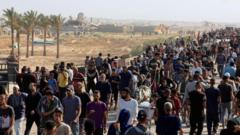The World Health Organization has condemned the catastrophic state of hospital care in Gaza, particularly after an Israeli air strike severely damaged al-Ahli hospital. The military's actions, amidst ongoing conflict, have led to critical medical shortages and urgent calls for protection of healthcare facilities.
Hospitals in Gaza Face Catastrophic Conditions Amid Ongoing Conflict

Hospitals in Gaza Face Catastrophic Conditions Amid Ongoing Conflict
WHO reports dire situation in Gaza hospitals following air strikes, with critical shortages in medical supplies and serious damage to facilities.
The World Health Organization (WHO) has described the situation in Gaza's hospitals as "beyond description," following significant damage to medical facilities due to Israeli air strikes. Spokeswoman Dr. Margaret Harris stated that attacks on hospitals and healthcare personnel are pervasive and that supplies are at critically low levels due to the ongoing blockade imposed by Israel.
On Sunday night, an Israeli air strike on al-Ahli hospital in Gaza City led to the destruction of its laboratory and damage to the emergency room, according to hospital staff. No immediate casualties were reported from the strike; however, a child reportedly passed away due to a disruption in care from the attack. The Israeli military claimed the strike targeted a Hamas "command-and-control center" but has faced backlash regarding the stark effects on healthcare settings.
The incident at al-Ahli marks the fifth attack on the facility since the onset of hostilities more than four weeks ago. The Anglican Diocese of Jerusalem reported that this recent strike obliterated a two-story genetic laboratory and harmed the pharmacy and emergency areas. Surrounding buildings, including St Philip's Church, also suffered damage. The diocese noted that the Israeli military had issued a 20-minute warning before the attack, yet one child died during the rushed evacuation process.
WHO Director-General Dr. Tedros Adhanom Ghebreyesus conveyed that al-Ahli's director reported extensive damage, rendering the emergency department inoperable. The facility was obliged to transfer 50 patients to other hospitals while 40 critical patients remained due to an inability to relocate. WHO emphasized the necessity to protect healthcare under international humanitarian law, demanding an end to attacks on medical care.
The Israeli government defended the strike, asserting it was a targeted effort against a Hamas facility alleging no medical activities were taking place there. The Church of England's House of Bishops expressed profound dismay over the ongoing attacks on hospitals, calling for an independent investigation into the incident and challenging the evidence of Hamas's alleged military use of the hospital.
Reports from the humanitarian organization Medical Aid for Palestinians highlighted the dire condition of patient care at al-Ahli, with an orthopaedic surgeon claiming the quality of care had devolved to levels akin to that of a hostel. The lack of essential medical supplies was further emphasized by WHO representatives, who lamented that the Israeli blockade has prevented humanitarian aid from entering Gaza for over six weeks.
The backdrop of the escalating conflict includes a military campaign launched by Israel in response to a cross-border attack on October 7, which resulted in over 1,200 deaths and the capture of numerous hostages. Gaza has faced an immense toll, with over 50,900 fatalities reported by local health authorities in the ensuing weeks.
Amidst negotiations for a ceasefire, discussions have faltered due to disagreements related to hostage releases and military action. While there is a desire for progress from both Hamas and Israel, the ongoing violence and lack of humanitarian access continue to deteriorate conditions for the civilian population in Gaza.


















